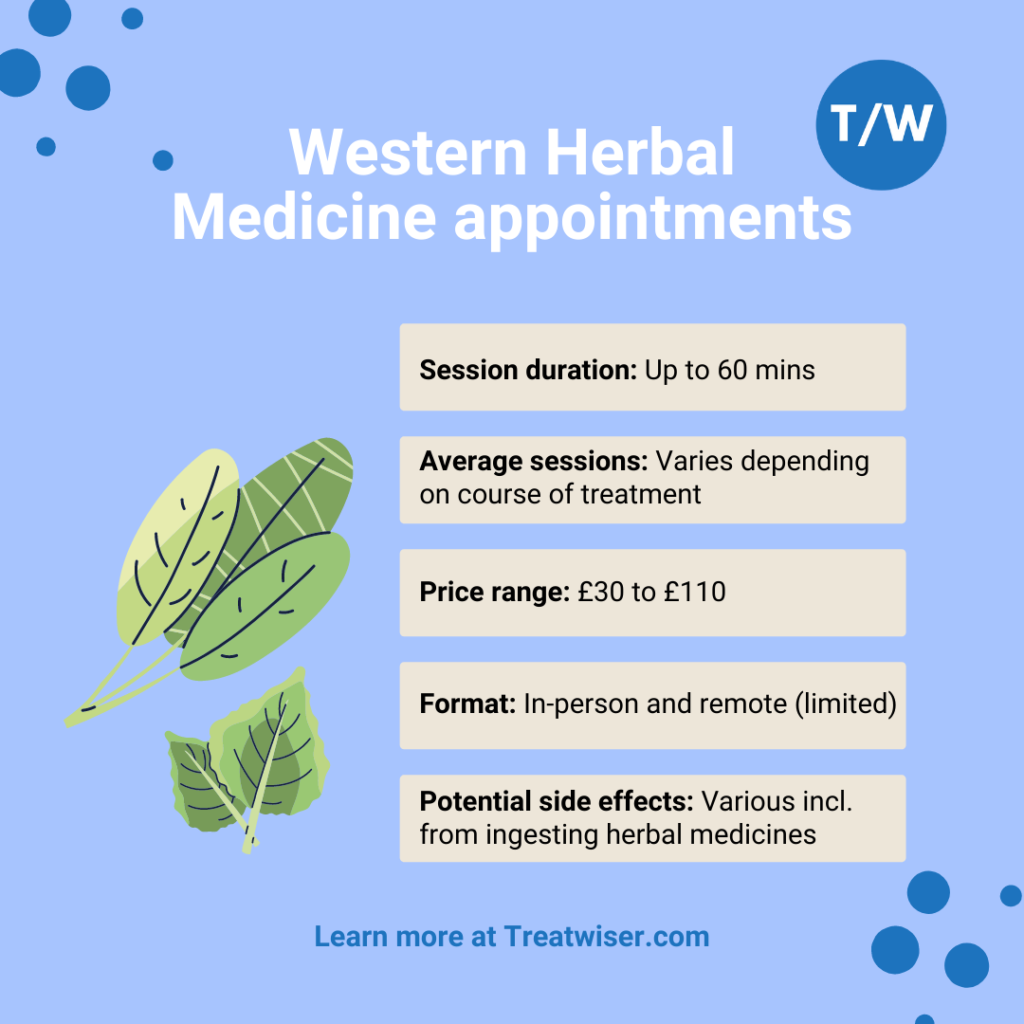Western herbal medicine is an age-old practice which uses the natural properties of plants to offer treatments with potentially long-lasting effects.
In this read, we will explore what is herbal medicine, its origins, where it is used, what proof there is that it is helpful, and what you need to consider when opting for it.
Table of contents
- 5 interesting facts about western herbal medicine
- What is western herbal medicine?
- Why should you consider this treatment?
- What is the theory behind western herbal medicine?
- When and how is western herbal medicine used?
- What is the evidence to support western herbal medicine?
- What can I expect as a western herbal medicine patient?
5 interesting facts about western herbal medicine

What is western herbal medicine?
Western Herbal Medicine is a longstanding traditional practice of herbalism from Europe and North America
It is also known as Phytotherapy and Medical Herbalism. Western Herbal Medicine uses herbal products against common diseases and disorders, affecting the human body. The natural properties of the herbs help and support against these maladies and support the bodies self-healing abilities.
Western Herbal Medicine history dates back as far as 50 A.D to the Greco-Roman era
Pedanius Dioscorides could be considered the fore founder with his book De Materia Medica, the oldest manuscript of herbal products in the Western world which documented herbal traditions of the time.
Nicholas Culpeper wrote and published Culpeper’s Complete Herbal in the 17th century which has never been out of print till this day and has given the general public many uses and properties of herbs, for use in common medical conditions.
Before the advent of modern science and technology, humanity relied on herbs for health and natural products for treating various diseases.
Over 50% of modern drugs are still, today, derived from herbs
With their healing properties, herbs can be a great and non-invasive treatment method. An herb has a number of constituents and therefore has a synergistic effect on the body. For example, Marshmallow contains salicylic acid, which when isolated is irritating to the stomach mucosa however, it also contains mucilage, which has a demulcent effect, which means it does not upset the stomach and is actually used in digestive inflammation.
Why should you consider this treatment?
Here we explore what Western herbal medicine is, what ailments it can treat, what proof there is that it is helpful!
Western herbal medicine uses all the different parts of the herb, including the leaf, flowers, fruit, root, rhizomes, seed and bark etc. The herbal products are dried and prepared into different types of medicines.
Western herbal medicines can come in a variety of forms but most common are; teas, powders, tinctures, capsules, creams and oils.
One thing that is common in Western and other Herbal “schools of thought”, is that they all aim at treating the underlying causes, instead of symptom relief. Meaning this treatment takes a holistic approach, by resolving the existing imbalance in the body.
In modern times, herbal medicines are selected with scientific reasoning, as well as the traditional use. Many Western herbs and formulars have been studied using scientific methods, with promising results.
Many scientific papers have given good credible evidence for their action and efficiency in different diseases.
Western herbal medicine is based on thousands of years of history with roots in European, Arabic, and Native American Culture.
It was historically influenced by Samuel Thompson 18th century a renowned Naturopath from North America. The alternative medical schools of the USA, The Physiomedicalists and The Eclectics, contributed to the philosophy and practice.
In the 20th Century, Dr John Christopher had a prodigious role in shaping the tradition, with many formulars, diets and protocols, listed in his book: The school of Natural Healing.
What is the theory behind Western herbal medicine?
Western herbal medicine works by supporting and strengthening the bodies organs and body systems, therefore supporting the bodies health and strength, which promotes the body self-healing potential.
Herbs are defined by their actions and categorised into different groups of terms; e.g., alterative herbs have a blood cleaning action, hepatics work on the liver and diaphoretics promote the body to sweat etc.
Studies show that holistic herbs used in Western herbal medicine have numerous positive effects, such as: digestion promoting, organ strengthening, tissue building and improving circulation.
Many herbal actions have been understood and proven scientifically
Numerous disorders such as digestive issues, skin problems, allergies, hormonal issues, musical-skeletal issues, lung problems and heart problems etc. can be supported with Western herbal medicine.
Western herbal medicines can also be a good way to reduce the toxicity of other conventional medicines and balancing some of the strong effects of these drugs, by supporting the various organs and body systems. Using apoptogen herbs is often useful for strengthening the body’s tissues and organs during and after taking allopathic medication. Some popular adaptogen herbs are: Ginseng, Eleuthero, Ashwagandha, Wild oat and Liquorice.
Western herbal medicine is focused on a holistic approach
The aim is not just to remove the disease’s symptoms, but to resolve the underlying causes.
This means that the Western herbalist will focus on the client’s constitution and body state, using holistic and energic diagnostic methods, along with modern reasoning to conclude the origin of the disorder. Medical history, diet, emotional state, and lifestyle choices, will all be taken into account.
When and how is Western herbal medicine applied?
Western herbal medicine can help with a broad range of conditions and common maladies
Be it digestive, circulatory, respiratory, nervous, muscular-skeletal, or immune. People can consult their practitioner for herbal treatment options.
Western herbal medicine holds treatment for a wide range of medical issues
Herbalists in this tradition use herbs from the categories needed to create an unique formular that is specific to the client’s needs. These formular vary from 4 to 12 herbs per preparation.
Herbs are taken in different forms, depending on the disease and the patient’s needs. They can be ingested in the form of capsules, teas, powders, and tinctures etc. and can even be applied topically as a cream or ointment.
Some examples of types of herbs for healing, are: Chamomile for indigestion, Milk thistle for liver detoxification, Hawthorn for heart health, Hops for insomnia and St John’s wort for mild, to moderate, depression.
What is the evidence to support Western herbal medicine?
There is continuous research on both the safety and effectiveness of Western herbal medicine.
Demand for it has gone up in modern times because people want to opt for more natural based remedies (e.g., herbal remedies for colds, herbal remedies for anxiety and stress) with lesser side-effects and long-lasting results.
This increased demand has led to an increased level of research on the effectiveness of Western herbal medicine.
A lot of herbal products that are in people’s common use became famous because of their efficacy being established through traditional use, clinical studies, testimonials, and randomized trials.
For example, a study done on the management of diabetes using Cinnamon, Fenugreek, Ginseng and Neem, showed that these plants do possess properties to control diabetes, through controlling blood sugar levels. It showed that these herbs can be used as a good integrative therapy alongside allopathic treatment for diabetes.
What can I expect as a Western herbal medicine patient?
Since Western herbal medicine endeavours to heal the person’s underlying issues instead of just the existing illness’s symptoms, your Western herbalist will conduct a detailed analysis of your background.
This includes your past medical history, current health status and family history, as well as details of your diet and lifestyle choices.
Depending on the consultation, the Western herbalist can give a pre-made formula or unique blend of tailored herbs, to provide you the specific requirements.

How do I find a Western herbalist and what qualifications should they have?
The UK and abroad there are many associations for Western herbal medicine. All the practitioners will be properly qualified and insured from these professional organisations and will follow the correct procedures and safety protocols.
The key bodies in UK are:
- The Association of Master Herbalists
- National Institute of Medical Herbalists
- The College of Practitioners of Phytotherapy
- Unified Register of Herbal Practitioners
You can also use Treatwiser’s directory to find a western herbal therapist near me. Use the search features to narrow your search by location, professional body membership status, and more.
How much will it cost?
Costs vary according to the country and consultant’s qualifications and expertise. Generally speaking, initial appointments cost more than follow-up sessions.
You can expect to pay from around £40 to £110 for the initial consultation, and around £30 to £80 for follow-up appointments.
And remember there is also the cost of the herbs themselves and this will vary according to the disorder and its severity etc. Expect to pay approximately £4 to £12 per week or £15 to £45 per month.
How many appointments will I need and over what period?
The number of appointments also varies quite a lot and is dependent on the individual’s condition.
As a rule of thumb, it is said, 1 month for each year, you have had the condition.
To conclude, Western herbal medicine has a lot to offer everyone, to improve your health and your life! Book an appointment today and give the therapy a try!
DISCLAIMER: The Site cannot and does not contain medical / health advice. The medical / health information is provided for general informational and educational purposes only and is not a substitute for professional advice. Accordingly, before seeking any form of medical advice, diagnoses or treatment based upon such information, we encourage you to consult with your GP or other qualified health practitioner. You must never disregard professional medical advice or delay in seeking it because of something mentioned on this Site. The use or reliance of any information contained on the site is solely at your own risk.





